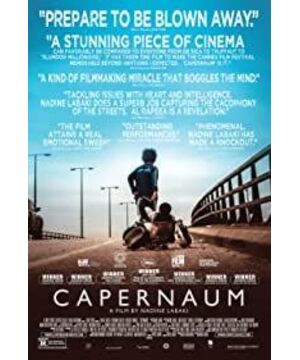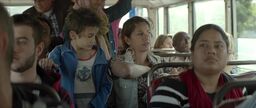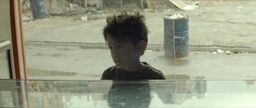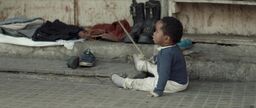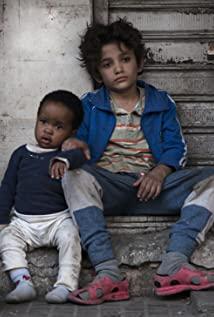The poorer you are, the more you are born, the poorer you are. This vicious cycle is understood by twelve-year-old children, but not by millions of adults below the poverty line. Not only in Lebanon, not only in the refugee group, this is an almost global problem, the middle and upper classes have low willingness to give birth, because they know the weight of the word responsibility, while the bottom live desperately, because many times they don't know what responsibility is at all. .
I didn't expect "What's Home" to be released in mainland China, and I didn't expect that a few days after the film was released, in the absence of a big IP and no celebrity blessing, the single-day box office went up all the way, securing the second spot in the schedule. Location.
As a literary film, "What's Home" can still occupy a place in the film market under the indiscriminate bombardment of super blockbusters such as "Avengers 4: Endgame", in addition to the excellent quality of the film itself, The social issues brought about by the film also played a very important role.
This work, which makes every viewer feel extremely distressed, asks each pair of parents these two tough questions:
What are the basic conditions for having children?
How should we be parents?
Some people say that the right to reproduce is one of the basic human rights. However, excessive and irrational fertility has brought about a "human rights disaster". A large part of the world's extremely poor population is caused by the "abuse" of "noble" reproductive rights. As the most populous country in the world, China will be surpassed by our neighboring countries in the near future. The reason is that while our country is controlling population growth, this neighboring country is infinitely "living"!
The right to reproduce is a basic human right, just as freedom is a basic universal value. From the perspective of the contract of human society, there is no absolute freedom, and reproductive rights should also have its "boundaries". The "boundary" of freedom can be delimited by law. Although there are cases where the "boundary" of reproductive rights is demarcated by law, this approach has certain risks, and in most cases, it is difficult to implement - above In the neighboring country mentioned in the article, there was also a political party that proposed a birth restriction policy, but the democratic system of one person, one vote made it impossible to really implement it.
Due to the influence of historical traditions and religious beliefs, for some ethnic groups, "life and life" can even become the only value of a woman's existence. You can say it's an affront to women's rights, but conversely, they can also "righteously" think that the so-called "women's rights" is a huge affront to their nation.
For Zane's parents in What's Home, the above discussion of reproductive rights is completely ineffective for them. At least, they never thought about this issue before being brought to court by their son, and they "lived" without restraint and reason, almost out of instinct. They may never have thought that, as human beings in modern society, there are social attributes such as (economic) ability and responsibility in addition to instinct. They are "living" like animals, but let their children live less than animals, in a way, they are "worse than animals".
What is even more frightening is that they, who are "worse than beasts", never realize that they are so "worse than beasts", and even after being brought to court by their son, they are still so insensitive and self-righteous.
In court, Zane's father said:
"I was born like this and grew up like this, what's wrong with me?"
And Zane's mother said:
"I've been a slave all my life, why do you criticize me?"
Yes, Zane's parents were "slaves" all their lives. But the story of Spartacus and the story of American abolition of slavery all tell us that slaves should also have "self-cultivation" so that they can escape the fate of slavery. Zane's parents are willing to be "slaves", but we are already living in the twenty-first century. Are they living in the ancient slavery era, or the nineteenth century?
They were born as "slaves", it's their tragedy, and they frantically make more "slaves", in terms of the universal values of modern society, they are anti-human and anti-social - they are "guilty" .
If Zane is also a "slave", then he is already an awakened "slave", a "slave" with "self-cultivation". He will never continue to make "slaves" like his parents. Judging from his "love" for his sister Saha and his care for Mr. Jonas, he has gotten rid of his "slave" status and grown into a human being.
"Making drugs" is one of the means of making a living for Zane's parents. When they "made drugs", they never cared about the existence of "little slaves". They even asked children who were ignorant of the world to help them "make drugs". The so-called "tiger poison does not eat its children", but they let the children bury the "root of poison" since childhood, which is really the most poisonous "parents' heart". When Zane took care of Mr. Jonas alone, he was desperate, he also "made drugs", but at a young age, he actually knew how to "get out of the way" for Mr. Jonas, which was heart-wrenching to tears.
The poorer you are, the more you are born, the poorer you are. This vicious cycle is understood by twelve-year-old children, but not by millions of adults below the poverty line. Not only in Lebanon, not only in the refugee group, this is an almost global problem, the middle and upper classes have low willingness to give birth, because they know the weight of the word responsibility, while the bottom live desperately, because many times they don't know what responsibility is at all. . Zane's parents in the film are pitiful, but they don't deserve sympathy.
After winning the Jury Prize at the Cannes Film Festival in May last year, "Why Home" has become a hot film in the international film industry. But it is conceivable that most parents like Zane's parents probably won't watch such a film - people living in "hell" may not need to understand "hell" through the screen, just as they are in reality. Lack of self-awareness and self-examination.
I believe that most of the Chinese viewers who have watched this film are people who are trying to be responsible parents or who are ready to be responsible parents. After watching the film, they may become more cautious about "having children", and their willingness to bear children may even decrease.
The world is so absurd that people who have the "potential" to be responsible parents don't want to have more or don't want to have children, while people who don't realize their "responsibility" are "living". Under such a fertility pattern, the color and power structure of the world will also undergo great changes, and the terrible phenomenon of "bad money drives out good money" may also occur in human beings, and human civilization may regress to the Middle Ages or even a darker era.
Zane himself has the same name as the character in the film, and he is also a little refugee, and his amazing "acting" in the film is actually a true performance. Zane's appearance in this film changed the fate of him and his family (with the help of the United Nations, Zane and his family moved to Norway together, and have since been away from "slave life"), but the vast majority of refugees can be Not as lucky as them. Any humanitarian aid is selective, and the so-called "purdue all sentient beings" is just an idealized and beautiful slogan.
As human beings, we are indeed born with reproductive rights, but how to exercise our reproductive rights rationally and responsibly is a question that every parent should consider. I hope every pair of Chinese parents can watch this "Why Home", not to see Zane "sell miserable" (he doesn't "sell", he is really "miserable"), but to give himself a " Warning" - If you don't have the confidence and the ability to give your child a "home", why don't you let him come into this world...
In fact, I may be thinking too much, and as a father, I probably can only try to be on my own.
"What's Home" is directed by Lebanese female director Nadine Labaki. Before "Why Home", Nadine Labaki directed and acted in "Caramel" (2007), "Where Are We Going" (2011) and other works that have a certain influence in the international film industry. "Why Home" is different from Nadine Labaki's previous works. Most of its main actors are non-professional actors, and the roles played have a greater similarity to their own identities. For Nadine Labaki, What's Home is a "simple turn" in her creative career.
The version released in mainland China is 9 minutes apart from the original. "Why Home" does not contain so-called "sensitive content". The reason why the Chinese mainland release version is shortened by 9 minutes is said to be a decision made by the filmmakers in order to control the length of the film and strive for more film arrangements. The deleted 9 minutes of content mainly deleted the scene of a supporting role that has little to do with the main plot - the scene of the "Spider-Man" old man.
View more about Capernaum reviews


